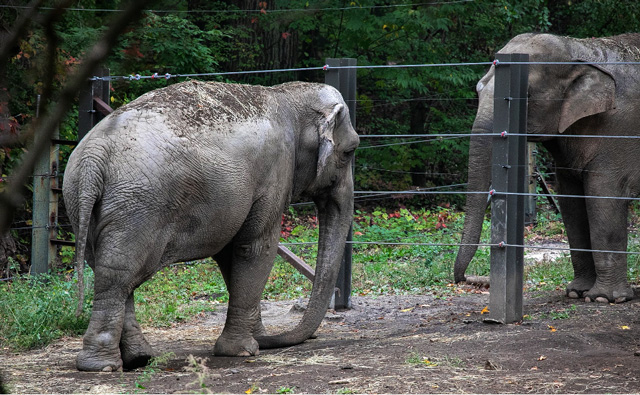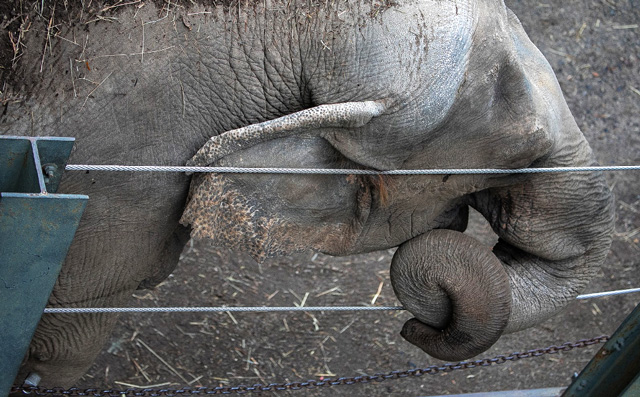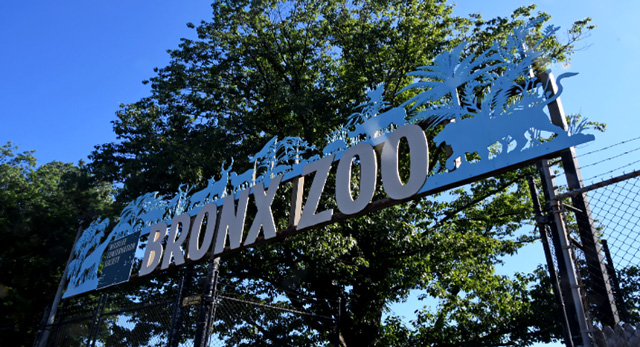Will Happy and Patty Be Released from Solitary?

Elephants Happy and Patty in their zoo enclosures separated by a wire fence. (Image provided by the Non-Human Rights Project)
By Elizabeth Perry
Elephants form lifelong bonds and need herds to thrive. This is one reason some New Yorkers want to transfer zoo elephants to sanctuaries. Happy and Patty have been inhabitants at the Bronx Zoo for 45 years.
“Happy and Patty in the Bronx Zoo are in complete isolation and in solitary, so they are, and have been hurting for many many years now,” said Shahana Hanif, Councilwoman for District 39 in New York City.
On March 16, Brooklyn Councilwoman Shahana Hanif and the Non-Human Rights Project (NhRP) proposed a bill that would, in effect, ban elephant captivity in New York City if certain requirements are not met. For the two elephants at the zoo, that would mean being relocated to an elephant sanctuary.
Though the bill does not go into specifics regarding the meaning of the term “sanctuary,” there are at least two in the United States, one in Tennessee and another in Northern California.
More specifically, the bill would prohibit forcing elephants to work, perform, or be ridden. It would also separate the male and female elephants into herds to avoid breeding and it would require the animals to have a habitat of at least 15 acres, as opposed to 1.5 acres Happy and Patty each live in today.
“If all we did was compare to the half acre or even two or three acres that captive elephants are typically restricted to, any improvement is better, but we know that providing even 10 times as much space as a zoo may not be enough for elephants to thrive,” says the Global Sanctuary for Elephants.

Happy in her zoo enclosure. (Image provided by the NrHP)
The Bronx Zoo disagrees that the elephants are living in unhealthy environments. “The Bronx Zoo takes excellent care of Happy and will continue to do so, along with all animals here at the zoo,” said Jim Breheny, Director of the Bronx Zoo and EVP of Zoos & Aquarium at the Wildlife Conservation Society. “Her well-being is assured by our dedicated staff and all the expertise they bring in providing excellent care for her for more than 40 years.”
According to Courtney Fern, director of government relations and campaigns at NhRP, the organization has been arguing for Happy’s legal personhood and fundamental right to bodily liberty since 2017.
Last summer, the Court of Appeals found in a 5-2 decision that the elephant, however self-aware and cognitively complex, did not have habeas corpus, a fundamental human right to bodily liberty and freedom from unfair confinement.
The Bronx Zoo’s Jim Breheny says the Non-Human Rights Project is using Happy to promote their own agenda. “NhRP and the experts they recruited for their petition, none of whom ever had any direct contact with or knowledge of Happy, have exploited Happy and the name of the Bronx Zoo to further their misguided philosophical agenda and fund-raise for their cause,” said Breheny. “NhRP has no real regard for Happy as an individual.”
Over the last three generations, Asian elephant numbers have dropped globally by at least 50%, and they’re still in decline today. With only 40,000-50,000 left in the wild, the species is classified as endangered.
For African elephants, the median life span is 17 years for zoo-born females, compared to 56 years in the Amboseli National Park population. Still, around the world there exist between 15,000-20,000 captive elephants.

Main entrance of the Bronx Zoo. (Image provided by the NrHP)
Since the Bronx Zoo’s opening in 1898, the zoo has remained a Bronx and New York City staple, even being considered one of the most famous zoos in the world. Spanning over 260 acres, and housing over 10,000 animals and more than 700 species, it is no surprise that the Bronx Zoo is ranked 6th in TimeOut’s list of best zoos in the U.S.
Elephants who reside in circuses and zoos are more likely to become neurotic, unhealthy, depressed, and aggressive, as a result of the inhumane conditions in which they are kept. Captive elephants suffer from neural deterioration, brain damage, and death of critical parts of their brain.
“Elephants are autonomous, social, cognitively and emotionally complex beings, who have evolved to move,” says Courtney Fern, director of government relations and campaigns at NhRP. “They are active more than 20 hours a day in the wild.”
When such needs are not met, “they often exhibit stereotypic behavior, such as rocking and swaying, which is a sign of brain damage and indicative of severe psychological distress. Happy has been observed engaging in [that] stereotypic behavior,” Fern added.
According to the NhRP, in 1977, Happy and another elephant named Grumpy were relocated from the Lion Country Safari in Loxahatchee, Florida, to the Bronx Zoo. In 2002, the zoo euthanized Grumpy after she was attacked by Happy and Maxine (one of the other elephants) who was also being held in captivity.
As a result, the zoo separated Happy from Patty and Maxine, and introduced a younger female Asian elephant named Sammie to be Happy’s companion. Sammie eventually died of kidney failure in 2005, leaving Happy in isolation.
“The Bronx Zoo used to have several elephants, and back in 2006 they had announced that they would close their elephant exhibition once one or more of the elephants had died, and that’s the truth right now that one or more elephants have died leaving them with two elephants,” said Councilwoman Hanif.
Since last month’s proposal, there have been no updates regarding the approval or vetoing of the elephant captivity banning bill.
Saved under Featured Slide, News
